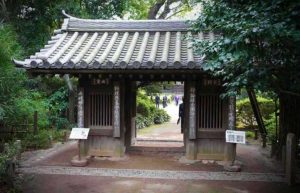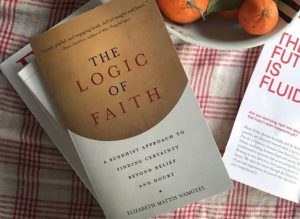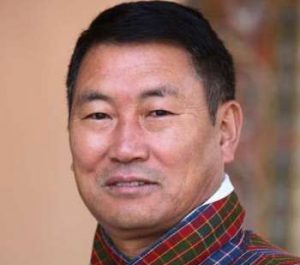
True benefit—the highest kind of rebirth
The teaching on the Three States of Mind is transmitted by Shakyamuni Buddha at the beginning of the Chapter on Non-meditative Virtues (the 14th Visualization) in the Contemplation Sutra. This passage outlines how rebirth in the Land of Bliss is possible for all people, particularly those of the lowest tier (of the nine grades of aspirants) that comprise the 16th Visualization.
As stated by Master Shandao, those of the three lowest grades are ordinary beings, particularly those Buddhists who take the Three Meritorious Deeds as the main cause of rebirth and the practices specified in each of the nine grades as aspiration for rebirth in the Land of Bliss.
It should be noted that the teaching on the Three States of Mind is spoken by Shakyamuni without being asked by any of His disciples or Queen Vaidehi. But before expounding on the rebirth of ordinary beings of different grades of aptitude, the Buddha first introduces the benefit of rebirth that results from awakening the Three States of Mind. Rebirth of this kind is of the highest grade in the highest tier, so practitioners will enjoy the greatest rewards under this circumstance.
Rebirth for those without secular roots of virtue and Buddhist roots of virtue
Though the Buddha does not immediately elaborate on the meaning of, or the context for, the Three States of Mind, he exhorts his disciples to “dedicate all the virtues and merits attained from the non-meditative virtuous practices, and aspire to rebirth in the Land of Bliss.” This exhortation is present in the description of the first five of the nine grades of aspirants (in descending order).
So it should be deduced that the Three States of Mind are related to “single-minded dedication and aspiration,” which is of the utmost importance for all Buddhist disciples aspiring to rebirth in the Land of Bliss. This point is also taken by Master Shandao to be the central theme of the entire Contemplation Sutra.
Shakyamuni Buddha then introduces the last four grades of rebirth, which deal with those who are just ordinary beings living in the mundane world, not those Buddhists who fail to accept and uphold the non-meditative virtues (the Three Meritorious Deeds), including those who think they can accept and uphold, but actually not.
In the lowest grade of the middle tier, aspirants are ordinary beings who practice the kindness and mercy of the secular world, but possess no roots of virtue derived from Buddhist teaching.
In the highest grade of the lowest tier, aspirants are iniquitous ordinary beings with no secular roots of virtue who have committed a host of evils without repentance. Though they encounter the Mahayana Buddhist teaching, they fail to accept it and thus acquire no virtuous roots from the Great Vehicle.
In the middle grade of the lowest tier, aspirants are iniquitous ordinary beings with no secular roots of virtues. They have violated both the lay and monastic precepts and committed numerous evils against the sangha. Though they encounter the Theravada Buddhist teaching, they fail to accept it and thus acquire no virtuous root derived from the Way of the Elders (Theravada).
In the lowest grade of the lowest tier, aspirants are iniquitous ordinary beings with neither secular nor Buddhist roots of virtue. They are miscreants of the worst sort who have committed the Five Gravest Offences and Ten Evil Acts, and await certain rebirth in hell, according to their karma.
Single-minded dedication and aspiration means the exclusive practice of Amitabha-recitation
How can the people of the last four grades attain rebirth in the Land of Bliss? According to the Contemplation Sutra, all of them are reborn through “Amitabha-recitation,” as praised by Amitabha Buddha upon his arrival to receive the dying aspirant. These persons have met a good teacher who, at the end of their lives, urges them to recite “Namo Amituofo” so as to be reborn in the Land of Bliss and escape the karmic retributions of hell.
Thus, it is easy to deduce that the Three States of Mind refer to both single-minded dedication (of merit) and aspiration (for assured rebirth) described in the first five grades of rebirth, and to the exclusive practice of Amitabha-recitation described in the last four grades of rebirth. But in reality, these two are actually one, as single-minded dedication and aspiration collapses into, and is contained by, the exclusive practice of Amitabha-recitation.
Master Shandao teaches that those who set forth the Three States of Mind accept them as the primary cause of rebirth in Amitabha’s Land of Bliss (rather than the non-meditative virtues of the Three Meritorious Deeds), and Amitabha-recitation as the primary practice for rebirth (instead of the miscellaneous practices listed in the descriptions of the nine grades of rebirth).
Because of this, once an aspirant has set forth the Three States of Mind, their exclusive recitation of Amitabha’s Name for the remainder of their lives will assuredly issue in rebirth in the Land of Bliss. In addition, this assurance is attained in the midst of their present lives, not at the moment of death.
Moreover, Master Shandao teaches that the Three States of Mind are not restricted to the Pure Land aspirants of non-meditative virtues, but are also applicable to those practicing meditative virtues, as per the thirteen contemplations stipulated in the Contemplation Sutra. In other words, they can also set forth the Three States of Mind and exclusively recite Amitabha’s Name to attain assured rebirth, rather than dedicating their meditative virtues in aspiration for rebirth in the Land of Bliss.
The concept of the Three States of Mind is derived from Amitabha’s Fundamental Vow
Our deliverance is assured because it is guaranteed by Amitabha Buddha, who fulfilled his compassionate vows ten eons (kalpas) ago and accumulated all necessary merit for exclusive Amitabha-reciters to be reborn in the Land of Bliss. In other words, all exclusive Amitabha-reciters can be reborn in the Pure Land through reliance on Amitabha Buddha’s 18th Vow. Amitabha’s deliverance is unconditionally and equally bestowed on all sentient beings of the Ten Directions: if they recite his Name exclusively, in aspiration for the Land of Bliss, they will certainly be reborn.
As long as aspirants recite Amitabha’s Name exclusively for the remainder of their lives, they will, as a matter of course, be received by Amitabha Buddha at the moment of death. It does not matter whether they are monastics or householders, men or women, Buddhists or non-Buddhists, practitioners of the meditative or non-meditative virtues, profoundly wise or painfully dull, possessed of abundant or scant virtue, good or evil, Bodhisattvas or hell beings. These are all mere conditioned appendages.
After setting forth the Three States of Mind as stated in the Contemplation Sutra, an aspirant strives to recite Amitabha’s name at all times, while walking, standing, sitting and reclining. In this way, they will no longer retrogress on the path to Buddhahood. This is because of 1) Amitabha’s compassionate dedication of merit; 2) his potent support; 3) the embrace of his light; 4) the merging of Amitabha with the sentient being; and 5) the protection and assistance of all Buddhas.
In the words of Master Shandao, “those who are embraced by [Amitabha’s] light will not retrogress” and “their minds are diamond-like.” If someone retrogresses, we can be sure that he or she has not yet awakened the Three States of Mind.













